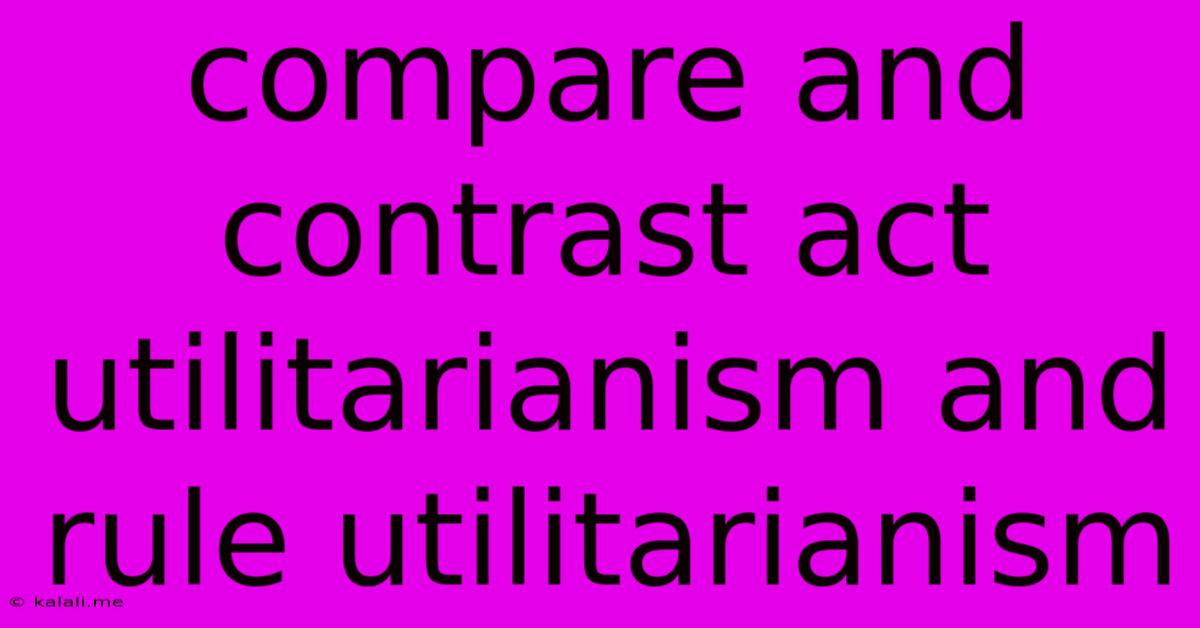Compare And Contrast Act Utilitarianism And Rule Utilitarianism
Kalali
May 29, 2025 · 4 min read

Table of Contents
Act Utilitarianism vs. Rule Utilitarianism: A Comparative Analysis
Utilitarianism, a prominent ethical theory, centers on the principle of maximizing overall happiness or well-being. However, within utilitarianism, there exists a crucial distinction between act utilitarianism and rule utilitarianism. This article will delve into a detailed comparison and contrast of these two approaches, examining their core tenets, strengths, and weaknesses. Understanding this difference is key to grasping the nuances of utilitarian ethical decision-making.
What is Utilitarianism? At its heart, utilitarianism argues that the best action is the one that produces the greatest good for the greatest number of people. This "greatest good" is often understood as maximizing happiness and minimizing suffering. However, the how of achieving this greatest good differs significantly between act and rule utilitarianism.
Act Utilitarianism: Focusing on Individual Acts
Act utilitarianism assesses the morality of an action based solely on its consequences. Each individual act is evaluated separately, and the action that produces the best outcome in that specific situation is deemed morally right. There are no pre-set rules or moral guidelines; the focus is always on the specific consequences of each action.
Key Characteristics of Act Utilitarianism:
- Consequentialist: The morality of an action is determined entirely by its consequences.
- Individualistic: Each act is judged independently, without reference to general rules.
- Flexible: It allows for exceptions to general moral rules if doing so maximizes overall well-being.
- Demanding: Requires careful consideration of potential consequences for every single action.
Example: Imagine a doctor who has five patients in need of organ transplants. A healthy individual walks into the hospital. An act utilitarian might argue that killing the healthy individual and harvesting their organs to save the five patients is the morally right action, as it maximizes overall well-being.
Strengths of Act Utilitarianism:
- Intuitive appeal: Directly focuses on producing the best outcomes.
- Flexibility: Adapts to specific circumstances.
Weaknesses of Act Utilitarianism:
- Potential for injustice: Can justify actions that violate individual rights or are otherwise considered morally wrong.
- Predictability issues: Difficult to reliably predict the consequences of actions.
- Demandingness objection: The constant calculation of consequences can be overwhelming and impractical.
Rule Utilitarianism: Prioritizing General Rules
Rule utilitarianism, in contrast, argues that we should follow general moral rules that, if consistently followed, would maximize overall happiness. Instead of assessing individual actions, it evaluates the overall utility of following a particular rule. The focus shifts from the consequences of a single action to the consequences of adopting a specific rule.
Key Characteristics of Rule Utilitarianism:
- Consequentialist (indirectly): Focuses on the overall consequences of adopting a rule, not each individual act.
- Rule-based: Emphasizes following general moral rules.
- Predictable: Offers more consistent moral guidance than act utilitarianism.
- Less Demanding: Less demanding on individuals in terms of constant calculation of consequences.
Example: A rule utilitarian might argue against killing the healthy individual in the previous example, even if it saves five lives, because establishing a general rule allowing the killing of innocent people would lead to far greater harm in the long run, creating an environment of fear and mistrust.
Strengths of Rule Utilitarianism:
- Avoids many of the counterintuitive implications of act utilitarianism. It safeguards individual rights and avoids justifying actions that are generally considered morally repugnant.
- Provides clearer moral guidance: Offers a set of general rules to follow, simplifying decision-making.
- More practical and less demanding: Reduces the burden of constant consequentialist calculation.
Weaknesses of Rule Utilitarianism:
- Potential for rigidity: May not adequately address exceptional circumstances where deviating from a rule might produce a better outcome.
- Conflict between rules: What happens when two rules conflict? Rule utilitarianism doesn't offer a clear resolution mechanism.
- Defining optimal rules: Determining which rules would maximize overall happiness can be challenging and subjective.
Comparing and Contrasting: A Summary Table
| Feature | Act Utilitarianism | Rule Utilitarianism |
|---|---|---|
| Focus | Consequences of individual acts | Consequences of following general rules |
| Moral Basis | Maximizing happiness in each specific case | Maximizing happiness by adhering to rules |
| Flexibility | Highly flexible | Less flexible |
| Predictability | Low | High |
| Demandingness | Highly demanding | Less demanding |
| Strengths | Intuitive, adaptable | Avoids injustice, provides clearer guidance |
| Weaknesses | Potential for injustice, unpredictable | Rigidity, potential rule conflicts |
Ultimately, both act and rule utilitarianism offer valuable perspectives on ethical decision-making. While act utilitarianism emphasizes the immediate consequences of individual actions, rule utilitarianism prioritizes the overall benefits of adhering to general moral principles. The choice between these approaches often depends on the specific context and the priorities of the decision-maker. Understanding their strengths and weaknesses is crucial for navigating complex ethical dilemmas.
Latest Posts
Latest Posts
-
How Do You Find Your Whatsapp Number
May 30, 2025
-
How Do You Make Super Powers
May 30, 2025
-
Will Usb Mini Reciever Work On Regular Usb Ports
May 30, 2025
-
What Has A Head But No Neck
May 30, 2025
-
How Long Does It Take For Weed Killer To Dry
May 30, 2025
Related Post
Thank you for visiting our website which covers about Compare And Contrast Act Utilitarianism And Rule Utilitarianism . We hope the information provided has been useful to you. Feel free to contact us if you have any questions or need further assistance. See you next time and don't miss to bookmark.